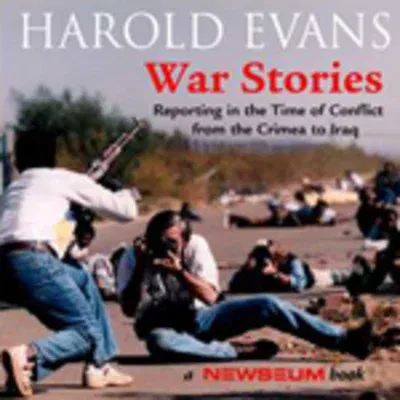The war correspondent trails clouds of glory. The names of the pioneers
of the trade are stardust: Ernest Hemingway, Alexander Dumas, Henry
Villard, Winston Churchill, Stephen Crane, John Reed, Arthur Conan
Doyle, Rudyard Kipling, Richard Harding Davis, John Dos Passos, John
Steinbeck, Jack London, George Orwell, Philip Gibbs, Luigi Barzini. The
names from World War II, Korea, and Vietnam, the Gulf War, and Kosovo
are likewise as redolent of adventure and derring-do, with
photojournalists and radio and televisioncommentators crowding the
pantheon. They are the eyes of history. War Stories: Reporting in the
Time of Conflict from The Crimea to Iraq tells their stories, from the
very first reports from the Crimean War in 1853 to the Second Gulf War
in 2003. War Stories: Reporting in the Time of Conflict From the Crimea
to Iraq tells their stories, from the very first reports from the
Crimean War in 1853 to the Second Gulf War. Through the notebooks,
photographs, headlines, wires, telegrams, and satellite uplinks and
direct interviews, Harold Evans describes the personal and professional
challenges of these uniquely dedicated men and women as they attempted
and succeeded, sometimes at the cost of their own lives, in retelling
the most immediate stories of war. Harold Evans is an internationally
acclaimed editor, author, and publisher. He was the editor of the
Sunday Times and The Times of London. He was subsequently president
and publisher of Random House and the editorial director for the
publishers of US News & World Report, The Daily News, and The
Atlantic. He is the author of The American Century. He guest curated
the Newseum exhibition that inspired this book. Harold Evans is the
author of two critically acclaimed best-selling histories of America:
The American Century and They Made America: From the Steam Engine to the
Search Engine: Two Centuries of Innovators. This book was the basis for
a four-part documentary of the same title on PBS, which he wrote. It is
also being adapted into a college curriculum. His latest book is My
Paper Chase: True Stories of Vanished Times, a memoir covering his early
life, his years in Britain's newspaper business and his move to America.
He is editor at large of The Week magazine, and moderates The Week's
panel discussions with political and economic leaders. Evans graduated
M.A. from Durham University and held a Harkness Fellowship at the
Universities of Chicago and Stanford. In London, he was the editor of
The Sunday Times from 1967 to 1981, and editor of The Times from 1981 to
1982. His account of these years was published in his best-selling book
Good Times, Bad Times. He was regular presenter on the TV series What
the Papers Say. Evans moved to America in 1984. He was the founding
editor of Conde Nast Traveler magazine and President and Publisher of
Random House Trade Group (1990-1997) From 1997-1999 he was Editorial
Director and Vice Chairman of U.S. News & World Report, the New York
Daily News, The Atlantic Monthly and Fast Company, a position from
which he resigned in January 2000 to write full time. (Evans remains a
Contributing Editor at U.S. News & World Report.) Among many
recognitions, Evans was awarded the European Gold Medal by the Institute
of Journalists. This followed his successful Sunday Times
investigation and campaign on behalf of children injured by the
pharmaceutical thalidomide. In 1999, he received the Lifetime
Achievement Award from the UK Press Award Committee, its highest
accolade. In 2000, Evans was honored as one of 50 World Press Heroes on
the 50th anniversary of the founding of the International Press
Institute in defense of press freedom; for the IPI's 60th anniversary,
he will deliver the keynote address at their 2010 conference in Vienna.
In 2001, British journalists voted him the greatest all time British
newspaper editor, and in 2004 he was honored with a knighthood in the
Queen's 2004 New Year's Honors list.

